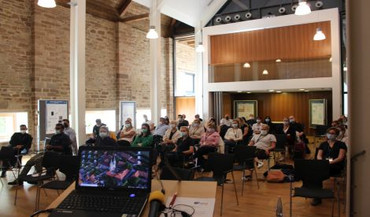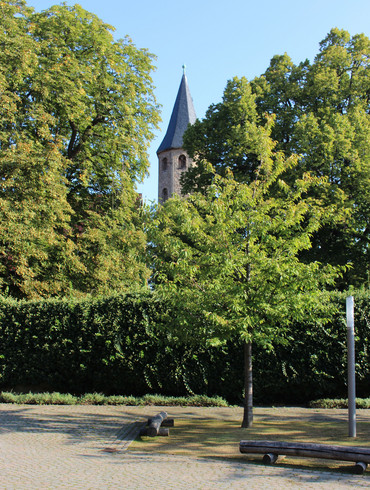First Scientific Retreat of the KFO5002

By Alexander Müller und Elisabeth Heßmann
Almost exactly one year after the KFO5002´s kick-off in September 2020, and after postponing twice due to the CoViD-19 pandemic, the CRU could finally hold its eagerly awaited first scientific retreat. Following strict hygiene guidelines, from Sunday, September 5th until Monday, September 6th, 2021, 53 participants gathered at Drübeck Monastery to present their findings, exchange information, discuss problems and plan for the tasks ahead. In five sessions, there were a total of twelve talks about each individual core (CP) and subproject (SP). In the talks, the presenters were asked to not only present the current scientific status of each project, but to also to put their findings in the conceptual framework of the KFO, to outline the project´s translational potential, and to comment on ongoing or planned collaborations within the consortium. In addition to the presentations, findings were thoroughly discussed in a poster session, in which every project was represented. Adi Mackay´s poster (SP5) entitled “HMGB1/2 as PDAC supportive and potential therapeutic targets” was awarded the prize for best poster of the retreat. The KFO5002 team was accompanied by two external reviewers, who gave feedback on the progress of each individual projects and the consortium as whole and provided highly valuable and constructive feedback: Prof. Heiner Wedemeyer, head of the Department of Gastroenterology and Hepatology at the Medical School Hannover and member of the KFO5002´s external advisory board, and Prof. Günter Schneider, who was recently appointed as Professor for Translational Oncology at the UMG and who has a long-standing expertise on PDAC research within and beyond the pancreatic cancer SFB1321 in Munich. After two days, we left the peaceful monastery at Drübeck with a plethora of new ideas, novel and re-enforced scientific collaborations, and a clear agenda for the second year of funding.
Some impressions from our student representatives

By Atmika Paul and Adi Mackay
It has been a few days since the retreat and our impressions are slowly being processed. The first impression we had in mind during this retreat and directly after is that we were feeling so fortunate that it could take place in-person this year. It has indeed been a long time since any of us had a chance to know our fellow researchers beyond our Zoom screens.
Having the scientific talks of all CPs and SPs in a sequential manner within the two-days retreat allowed us to connect all these projects in our minds and see the big picture of KFO5002. The retreat emphasized the immense translational potential of all our research projects. We got to know about the specific expertise / research focus of the groups. And now, it has become easier to cooperate with our colleagues and friends about research protocols or scientific ideas, as we finally got to know each other without a screen separating us.
Despite the challenges COVID casted on us since the establishment of the KFO5002, all the projects advanced vastly and presented a high workload performed individually or in collaboration, leading to interesting results which were discussed extensively. These discussions raised legitimate and important questions that are to be answered within the KFO5002 framework. It further allowed the different groups to voice their concerns and doubts in their respective individual projects. We put our minds together to consider the most feasible solutions to these concerns and discussed the importance of our work and their translational potential in the broad context of the entire KFO5002.
We believe that knowing each other in person will further foster the cooperative and collaborative nature of the KFO5002 and in turn will bring exciting new opportunities to each project individually as well as the entire consortium.
The retreat concluded with the announcement of a second retreat in 2022 - to which we are certainly looking forward.
You may also be interested in